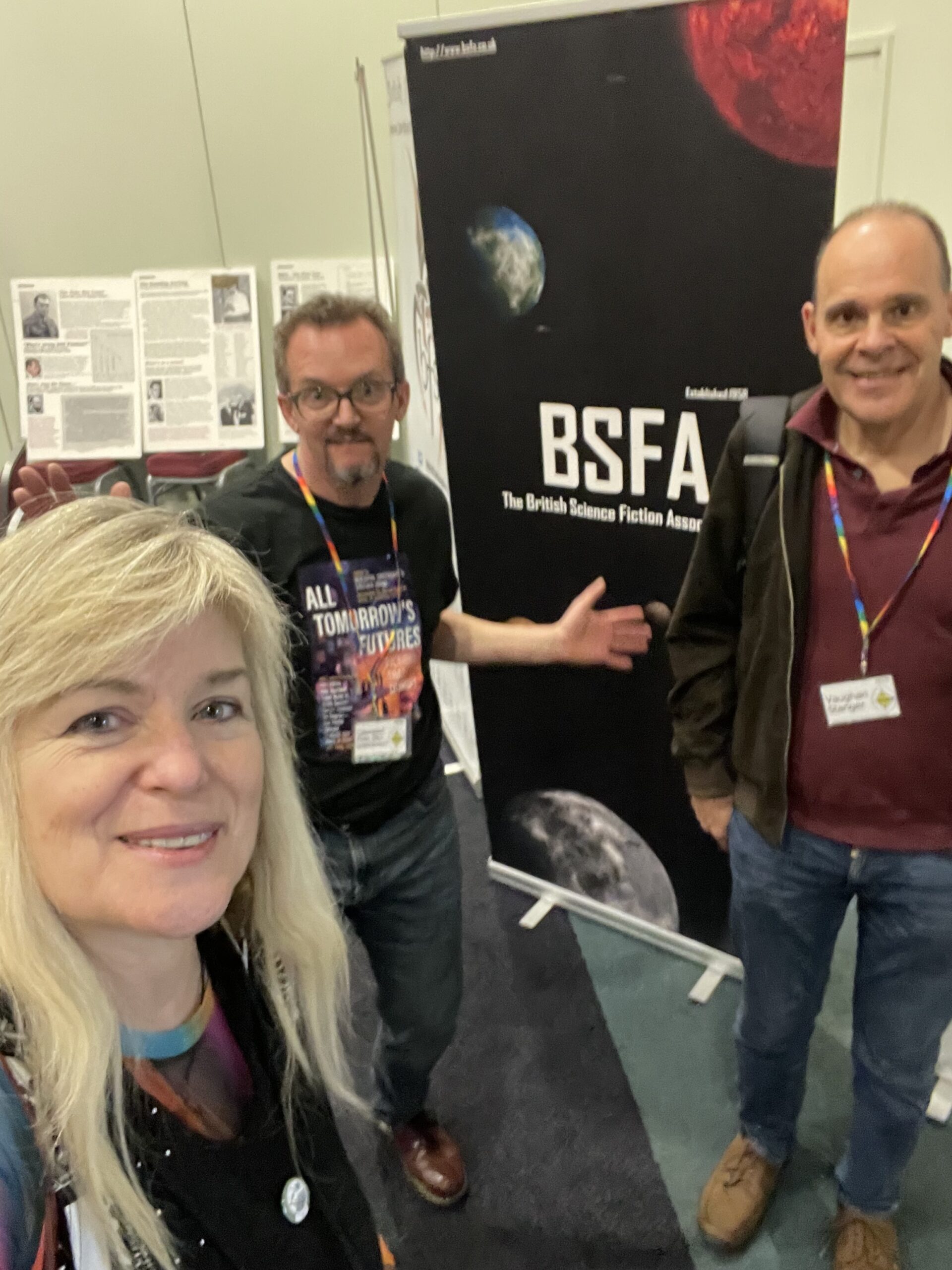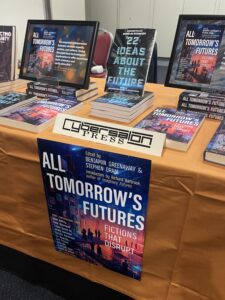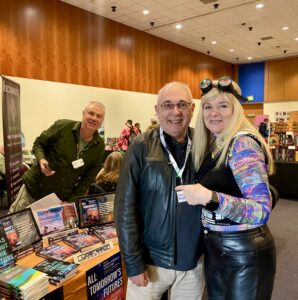
“All Tomorrow’s Futures” book launch at EasterCon, British Sci-Fi Association Fest in Telford
An increased wave of anxieties about rapid advancement of AI and impact on jobs has been at the epicentre of EasterCon this year. It was very appropriate that the yearly gathering of British science fiction community was held in Telford, the site of the first Iron Bridge, considered a symbol of the beginning of Industrial Revolution. Constructed by Abraham Darby III, it stands proudly over the deep gorge, reminding us about human ingenuity triumphing over nature.
Science fiction writers and fans naturally think a lot about the future and so the synergy of our think tank expertise and the imagination of the sci-fi community triggered fascinating conversations and intense discussions.
This year we gathered to discuss how story telling can play a role in shaping public perception and policy around the risks and benefits of rapid technology change, including machine learning in education.
Cybersalon Press, an indie publisher born out of Cybersalon.Org Think-tank launched a new anthology “All Tomorrow’s Futures”, edited by Stephen Oram and Benjamin Greenaway. The book is the outcome of 18 months long series of workshops with sci-fi writers and medics, scientists and technologists from King’s College London, the College of Policing, senior law practitioners, energy experts and other advisers.
Contributors to roundtable discussions at the book launch included David Birch (author of “Identity is the New Money”), neuroscientist Dr Danbee Kim, writers Rosie Oliver, Sophie Spearham, Vaughan Stanger, Eva Pascoe and our book editors Stephen Oram and Ben Greenaway.
It was the first time BSFA held a hybrid book launch, with contributing writers and experts based in France, Portugal, Canada and US joining in VR Cyberia café, hosted by Ben and Eva alongside the main in-person launch at EasterCon Telford. Ira Nayman, Jayen Parmar, Jesse Rowell, Christine Aicardi (King’s College) and Rosie Oliver joined us to discuss their reactions to the book getting finally published.
One of the topics we discussed was futureproofing of writers’ output in different formats, with contributors noting that they buy paper books for their own reading, but also Kindle for reading while commuting or travelling. This pattern may be indicating a new hybrid reading habit, with digital format serving as a convenient and easily searchable back up to a beautifully printed artifact of a paper book.
The stories in the book cover areas from AI in Crime & Policing to quest for human longevity and the impact of machine learning in education. In Vaughan Stanger’s story “Elephant Talk”, AI is used to communicate with (somewhat reluctant) non-human creatures, who take a rather dim view of the invitation to share their thousands year old knowledge with relative late arrivals to the ecosystem like humans, represented in the story by an ambitious but naive scientist Dr Dorney.
In one of the more optimistic stories Paul Currion explores the opportunity to use AI to connect with the non-typical cognition of Arjun, an autistic teenager befriended by his teaching assistant. Stephen Oram explores, through the eyes of a rebellious student Simone, a diminishing value of teaching to exams, something of a legacy in the era of AI pocket assistants, raising the discussion on how we assess educational progress if exams that only test knowledge are likely to be redundant. Eva Pascoe’s story of Bridget, in “Journey to Brindisfarne Abbey” forecasts use of synthetic womb for birthing babies by older women, or women who can’t carry pregnancy to term. She explores use of AI to support emotional communication with an unborn child, to help form a loving maternal attachment via haptic belt connected to the birthing pod.
AI concerns, till recently firmly anchored in science fiction, have now shifted to present tense and storytelling reveals the possible scenarios, giving us opportunity to deep dive into the future impact, even if at times it feels uncomfortable. The authors and experts on the panel agreed that providing a trigger and platform for those discussions with the wider public is a role where speculative fiction writing could be very valuable, not least in creating a shared vocabulary for interdisciplinary experts.
In a separate BSFA panel on “Machines Learn, Humans Thrive”, with Dr Danbee Kim and our editors and writers, we explored a future when AI will replace a high percentage of today’s jobs, but with glimpse of the future showing that new jobs are likely to emerge. Dr Kim noted that from a neuroscience point of view, future education processes need to shift away from singular in-depth, 10,000 hours mastery of a skill training to focus on providing sequential learning frameworks and a shared cultural common knowledge to keep the community together.
Telford may be a place for the first Iron Bridge in the world, but it is not just a significant historical location. This April, it hosted stimulating and future focused EasterCon, with the hybrid VR book launch, with talks on impact of new technologies on our society and bringing together international sci fi writers and editors. There may be dangers for job loss lurking in rapid AI progress, but new technology also bringing new connections, enabling us to bond in VR with writers and colleagues. A big Thank You to EasterCon organisers!
For Press and Reviewers’ copy, please get in touch with [email protected]
Cybersalon Press






